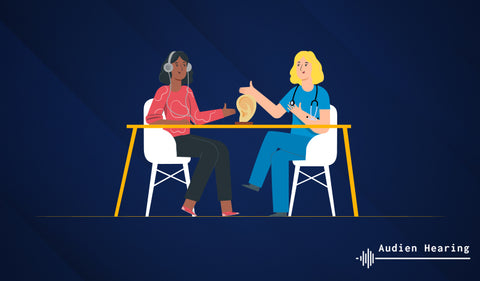Noise exposure is one of the most common causes of both hearing loss and tinnitus. Exposure to loud noises for even short periods of time may cause temporary damage and potentially tinnitus symptoms. Longer term noise exposure can significantly increase your chances of having hearing loss or tinnitus.
In this article we’ll briefly examine how noise exposure can cause tinnitus, hearing loss and other hearing-related problems.
How Does Noise Exposure Cause Tinnitus?

Noise exposure is one of the most common causes of tinnitus. Exposure to loud noises for both short and long term periods can cause acute or chronic tinnitus. The higher the decibels (the louder the noise), and the longer the duration of exposure, the higher your dosage and the more potential for damage there is.
A high dosage of noise can damage the tiny hairs in your ear called cilia, which help you pick up and process sound inputs. Damage to these hairs can cause hearing loss and tinnitus.
It’s important to be aware of the dangers of loud noise exposure and to take conscious steps to avoid it. Recognize situations where you are having to raise your voice to be heard, and particularly where the sound is too loud to the point where it’s uncomfortable.
Can I Get Tinnitus From Short Term Noise Exposure?

Yes. Tinnitus can occur after short term noise exposure, although generally short term noise exposure is more likely to lead to short term symptoms of tinnitus. Some people may report ringing in their ears after going out to clubs or a concert, which is a case of short term tinnitus.
If you are going to be exposed to loud noise even for a short time, practice caution by using ear plugs or avoiding going too close to speakers. Tinnitus, even if short term, is indicative of hearing damage.
Is Tinnitus From Noise Exposure Permanent?

It depends. In certain cases, permanent tinnitus may occur after extreme noise exposure, even for a short period of time. That said, most of the time, short term noise exposure will only cause short term tinnitus symptoms.
Tinnitus from long term noise exposure is more likely to be permanent. This is because longer term noise exposure indicates a higher dosage of sound and more damage to the cilia and other hearing functions.
Even recurring cases of tinnitus may go away after time. Especially if you are experiencing symptoms of tinnitus, it’s important to minimize noise exposure and prevent further damage to your hearing.
What Should I Do If I Think I Have Tinnitus?

If you think you or a loved one has tinnitus, we recommend consulting an Ear, Nose and Throat doctor who can help you to diagnose and treat tinnitus. The doctor will have you see an audiologist for a full hearing test. This can give you insight into what type of tinnitus you have, what the cause of it is, and what your best treatment options may be.
Tinnitus can have a significant impact on lifestyle and mental health, so it’s important to know you aren’t alone and there are treatment options available.
For more information, read our article “Tinnitus Treatments”.
The Bottom Line

Noise exposure directly contributes to both hearing loss and tinnitus. You should do what you can to avoid exposure to loud noise for extended periods of time, as it may cause permanent hearing damage, hearing loss or tinnitus.
If you do already have tinnitus, you’re not alone. There are a wide variety of treatment options available including hearing aids that are actually affordable. So take the steps to take care of your tinnitus and enjoy a better quality of life!













